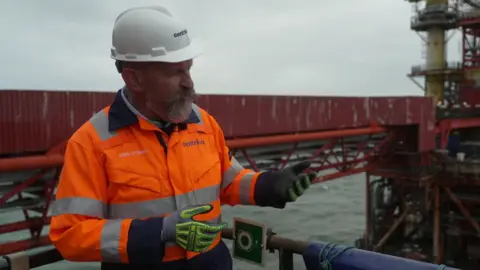Energy boss warns over future of gas storage facility
 BBC
BBCThe UK's largest gas storage facility could be closed if the government does not help support a redevelopment of the site, the boss of the company which owns it has told the BBC.
Centrica chief executive Chris O'Shea told BBC One's Sunday with Laura Kuenssberg programme that its Rough storage facility would be "shut down" without government help over energy pricing.
Centrica - which owns British Gas - says the site is set to lose £100m this year, and it wants to invest £2bn in the facility so it can use it to store more gas, including hydrogen.
The government said the future of Rough was a commercial decision for Centrica but it was open to discussing proposals.
The Rough facility is off the coast of East Yorkshire, and accounts for about half of the capacity the UK has to store gas.
It was closed in 2017, but then partly reopened in October 2022 following the energy crisis triggered by Russia's invasion of Ukraine.
Earlier this month, Centrica said it was in "constructive discussions" with the government for a support mechanism that would allow investment in the Rough site to proceed.
The company is seeking a "cap and floor" pricing mechanism. This means that if energy prices fall below a certain level its revenues will be topped up, but prices would be capped if they rise too high.
"What we're asking for is simply for the government to help create the conditions which will unlock £2bn of investment," Mr O'Shea told the BBC.
"It will create thousands of jobs in the construction phase, and it will safeguard the jobs of very highly skilled colleagues that are offshore."
Without this investment he said the site would be decommissioned "and we'll lose this resilience".
He said the UK currently has 12 days of gas storage, of which Rough provides six.
"So if we don't have Rough anymore, then we go down to six days. Now, if we take Rough to full capacity, we will go up to about 25, or 30 days."
A Department for Energy Security and Net Zero spokesperson said while the future of Rough was a commercial decision for Centrica, "we remain open to discussing proposals on gas storage sites, as long as it provides value for money for taxpayers".
Last week, Mr O'Shea said the way that the energy pricing mechanism worked meant that building of renewables would not "materially" reduce UK electricity prices from current levels.
He told Laura Kuenssberg on a visit to the North Sea platform that decarbonisation was important and also a "huge economic opportunity".
However he added that "the price we see today for electricity is the same as the price that we're given to new renewable developments".
"Therefore, that new renewable development will not bring down the price."
He added that he thought the government's 2030 target for clean energy was "very challenging, but I think it's right that the energy secretary has set a very stretching target".
"It's not impossible, no, but it's not easy."
The Department for Energy Security and Net Zero said: "As shown by the National Energy System Operator's independent report, our mission for clean power by 2030 is achievable and will deliver a more secure energy system, which could see a lower cost of electricity and lower bills."
Pay row
Last year, Mr O'Shea told the BBC that the £4.5m pay he received the previous year was "impossible to justify".
And earlier this month, nearly 40% of Centrica's shareholders voted against the company's latest pay plans.
When asked about this by Laura Kuenssberg, Mr O'Shea said: "I don't set my own pay.
"I think it's really difficult," he said. "I am unbelievably fortunate. I have a job where the market rate is is more than ever thought I would have done."
